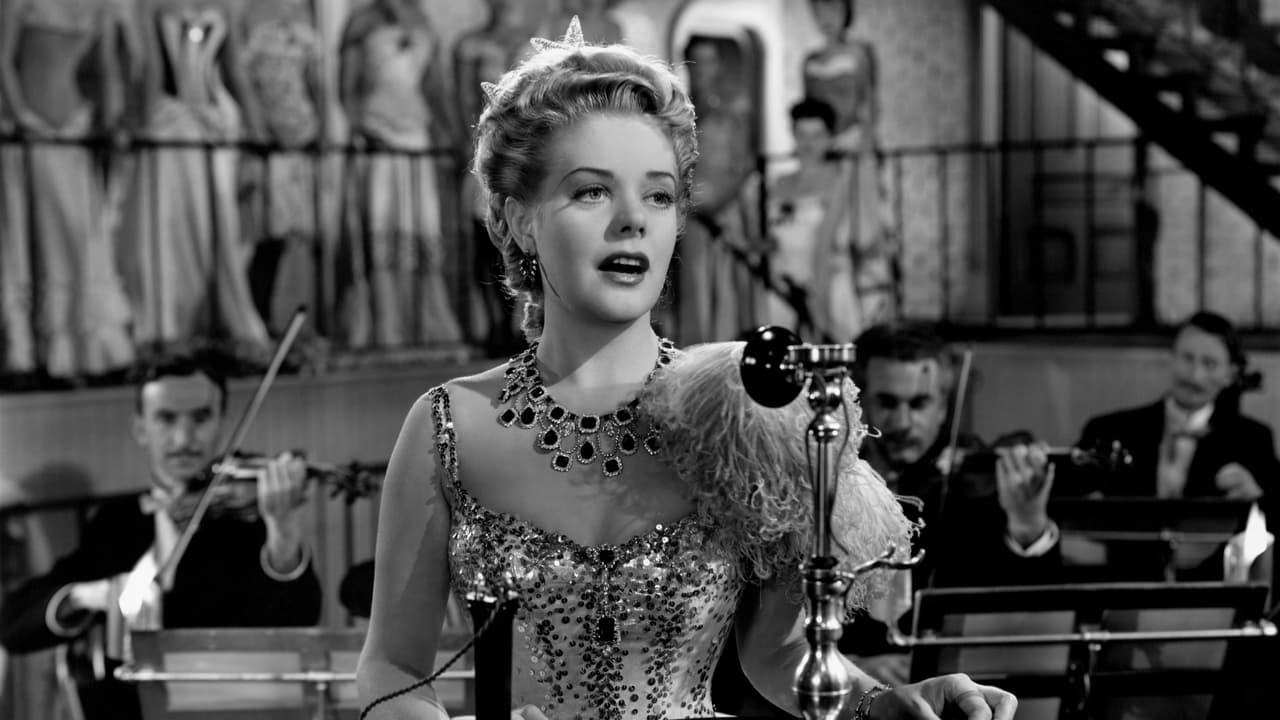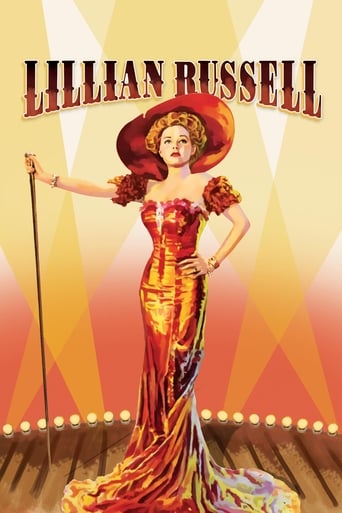



What makes it different from others?
Terrible acting, screenplay and direction.
Amazing worth wacthing. So good. Biased but well made with many good points.
View MoreThe plot isn't so bad, but the pace of storytelling is too slow which makes people bored. Certain moments are so obvious and unnecessary for the main plot. I would've fast-forwarded those moments if it was an online streaming. The ending looks like implying a sequel, not sure if this movie will get one
View MoreHenry Fonda is thrown into action by trying to halt two spirited horses charging down the street with an open carriage. This is the kind of incident that propels a story forward. Without it, there's no need for Fonda to be in the film.You get a clear sense of who Lillian Russell is. She wants to sing on stage just like an actor wants to act in the theatre. She is consumed by her ambition and cannot see herself doing anything else.I'm not particularly a fan of Don Ameche and I'm not sure if he contributes anything to this film.It touches on the Suffragette Movement, but that's just a backdrop. It's not the story.Overall, it plods along without any engagement in terms of story or character. Fonda fans would do well to stay away from this film.
View MoreIn the 1930s and 40s, Hollywood made a ton of bio-pics. In most cases, the actual peoples' lives were only the barest of outlines for the films--with SIGNIFICANT padding (in other words, outright lying) to make the films more marketable. While the films were generally pretty enjoyable, they also were pure bunk--so when watching any biography from this period, take what you see and hear with a grain of salt. I say all this here because "Lillian Russell" is just one of those films--filled with fiction and is only a biography in name only.While in some ways this film is accurate about the great stage actress Lillian Russell, here are a few ways where the film is total bull: The film shows Lillian's parents as a loving couple. They actually separated when Lillian was 18 and she and her mother moved across country--leaving dad behind.Lillian's first marriage in the film is the biggest problem in the film. Her creepy husband (Don Ameche) dies--leaving her a sad, sad widow who then sings HIS song as a tribute to him. In reality, it turned out this total louse was ALREADY MARRIED!!!! When Lillian discovered he was a bigamist, she divorced him! Some love story!!! He also was her second husband--and she'd been cheating on her poor old first husband! Lillian was married four times...but not in this movie! She only married once and there is an implied marriage at the end. Her beautiful baby is important in the film. The fact that it died as an infant was never mentioned!Lillian herself was a feminist and suffragette--writing articles and speaking out for the cause. None of this is in the film and only her mother's political aspirations are discussed--odd considering the film is supposed to be about Lillian.The film, despite having a completely dull and inaccurate plot, was a big-budget film--with AMAZING sets and lots of stars. It was odd, however, that despite having many big-name actors in the film that they were often used very poorly. Don Ameche, probably Fox's #1 male star at the time, plays a simpering loser--who also behaves VERY creepy 80 minutes into the film (where he basically says she can NEVER, NEVER leave him--even if she wants to!). Clearly it was NOT a role suited to such an illustrious star and might have been better for Boris Karloff! Henry Fonda basically plays a love-sick loser....and a creepy one who has stalked her from afar. Warren William is in the film...and that's all that can be said about his part. Pretty much the same can be said for Leo Carillo. Edward Arnold isn't bad as Diamond Jim Brady, however, and Helen Westley is GREAT as grandma. And as for the star, Alice Faye, this is one of her best films and the makeup and costuming folks have made her radiant. Clearly the women in this film outshine the men--as if the men, for a change, are more window dressing than people.The overall verdict is that although the film looks great and has some decent moments, it's a dull, bloated and incredibly inaccurate film. By the way, there is a VERY funny glitch at the 89 minute mark. Lillian picks up her crying baby. The closeup of the kid is of a completely different kid--with the hair changing from brown to blond before your very eyes--and with a completely different face!! Didn't they think anyone would notice.FYI--This film was wildly inaccurate that there is a special feature on the DVD entitled "A Woman Like No Other: The Real Lillian Russell"! It is worth seeing. It also shows that Lillian's life was FAR more interesting than the 20th Century-Fox film!
View MoreThe costumes and some musical numbers keep this movie from being a total flop, but you have to give the makers a hand, they really tried for awful and only missed by a little bit. Alice Faye is at her bland worst. The songs are well sung with all the life of overdone spaghetti.Lillian Russell was a fascinating woman with an incredible life. Her fame within her lifetime was enormous. She had an early childhood that gave her independence and made her an early suffragette. Her four husbands, the long time affair with Diamond Jim Brady, her later career when her voice failed, her activities during WWI all add up to a movie that should be made in the future. Maybe someday a movie will do her justice. This one isn't it.
View MoreSome historical films are totally worthless as guides to the lives and careers of the people they discuss. PARNELL, for instance, is a dismal film about the great Irish nationalist leader. LILLIAN RUSSELL is not a good guide to the career of the the famed singer and entertainer of the 1890s. There are omissions and polite bowdlerizing. For example, her marriage to Edward Solomon the composer(played by Don Ameche) was not ended by his dropping dead from overwork. Effective movie moment that it is, the marriage ended when Lillian discovered her husband was a bigamist with a living first wife. The relationship with Gilbert and Sullivan was not ended on such a sad but friendly note. Lillian did appear in PATIENCE, but she never played IOLANTHE (Gilbert claimed she did not want to rehearse as much as he insisted his performers do; rumor said that Gilbert tried to get Lillian onto the "casting couch" at the Savoy but she said no). Also, it is highly unlikely that Sullivan would have agreed to Lillian singing another composer's song in his operetta (even if between acts).Henry Fonda's Alexander Moore is a bland enough character - handsome and kindly in the film, but not as colorful as rivals Ameche, Edward Arnold ("Diamond Jim" Brady) and Warren Williams (Jesse Lewisohn). In real life he was an important newspaperman in Pennsylvania and the Midwest, and (less acceptable in hindsight) a close friend of Warren Harding and Harry Daugherty's "Ohio Gang" of political spoils-men. Lillian, by the way, died in 1922, in the middle of Harding's corrupt administration.The best things in the film are Faye, as pretty as usual in 19th Century costume, and warbling songs like "Blue Love Bird" in her best voice. That is worth watching. Then there is the color of the theater in the mauve decade. Tony Pastor's, the Savoy Operas, the stage of 19th Century Broadway (back then down near 14th Street and Union Square). My favorite moment: Joe Weber and Lou Fields in costume as their "Dutch" characters of the 1890s, demolishing a game of "Casino". It is a priceless moment of theatrical magic, that briefly tells us more about the real 1890s than the fake movie script for this film. Watch it for Joe and Lou and Alice.
View More